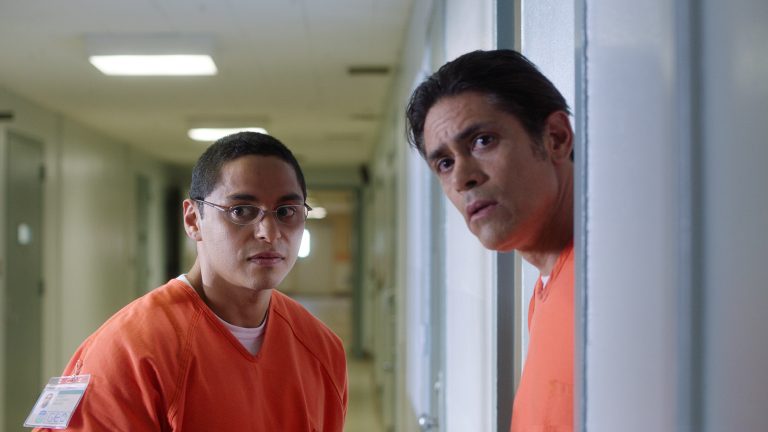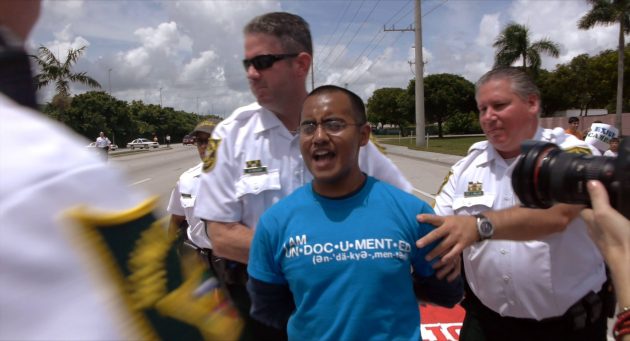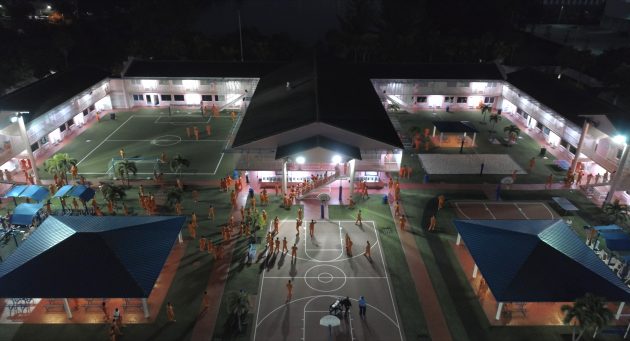
The US Immigration System Laid Bare: An Interview with the Directors of ‘The Infiltrators’
07 October, 2020Alex Rivera and Cristina Ibarra, directors of The Infiltrators (2019), spoke about their bold hybrid documentary and why it brings undocumented migrants into the spotlight.
Available to stream at pov.org (PBS) throughout October, The Infiltrators tells the story of two undocumented activists who risk deportation to go undercover in a detention centre and work for the release of the detainees. Winning two prizes at the 2019 Sundance Film Festival, The Infiltrators documents the current climate for undocumented migrants in the US and is told with an urgency that makes it necessary viewing.
The two activists get involved when the family of Claudio call the National Immigrant Youth Alliance, after watching their relative being forced into a car by US Immigration and Customs Enforcement. We follow young activists Marco and Vidi as they infiltrate the Broward Transitional Center, a privately run detention centre housing hundreds of men and women. Marco goes undercover with the belief that “none of us is free as long as one family is suffering deportation or separation” and as he makes contact with Claudio he meets more people separated from their families and living in limbo. Increasingly under pressure from the authorities, the activists start a network among fellow detainees while trying to keep their work hidden.
What makes The Infiltrators stand out is the blended use of documentary and narrative fiction; dramatic scenes are interwoven with interviews and footage of the real-life protagonists. The scene where Vidi deliberately tries to get detained by the Border Patrol, humourous and tense at the same time, is partnered with the audio of the conversation between the real Vidi and the arresting officer. Claudio’s son is interviewed while his father is inside Broward. We follow Mohammed and the network of Dreamers on the outside working on Claudio’s release. The parallel nature of real life and dramatisation makes for compelling viewing. What emerges is a portrait of a hidden reality for so many undocumented migrants: a reality that, thanks to this film, can now reach new audiences.
Below is an interview with directors Alex Rivera and Cristina Ibarra, to discuss the film and and its context.
How did you get into film making about migration?
Cristina: I grew up on the US-Mexico border and I grew up on the US side but with families split on both sides. When you grow up crossing the border so often you really start to notice the differences in how people cross. I can cross because I’m American, and my cousins some of them can’t even cross, some of them have to show a Green Card, some of them have to show documents, so those questions are some of the questions I explore through my filmmaking. The filmmaking I do is more about the border, and migration is part of that but it’s more about border identity. And I really care about how stories are told about the border. I’ve been working alongside Alex separately but on my own kinds of documentaries and I’ve always enjoyed our conversations throughout the years and I’ve looked for ways to partner up with him and this just seemed like the perfect type of film for us. We both come from families with immigrants and mixed status families and we’ve both cared about the theme our whole lives, and because I have this kind of emphasis on documentary and he has this emphasis more on experimental and fiction, and it seemed like a great way to deal with the challenge we had storytelling.
Alex: Like Cristina, I come from a cross-border family, a different border, half of my family is from Peru, my Dad’s from Lima and my Mum is from Brooklyn, of Irish descent, and I was born in New York city. Since the 1990s I’ve been interested in the politics of immigration. We keep going through cycles in this country of what you might call hategasms, where we have this rising of anti-immigrant hate and that was happening in the 1990s when I started to become a filmmaker; we were going through a powerful eruption of anti-immigrant hate coming from California. Like Cristina it’s basically a family connected to undocumented immigrants, that made me feel that inside this world of immigration there’s a whole universe of stories. So, I’ve made a career now, of over 20 years, telling stories pretty exclusively about immigration, about the border. It’s not a topic for me; it’s a landscape. It’s that thought space.
Where did the idea for The Infiltrators come from? At what stage did you get involved?
Alex: I had seen in the news in 2010 the actions of the National Immigrant Youth Alliance, they were in my understanding, in world history, the first group to organise undocumented immigrants to do acts of civil disobedience – to throw themselves at the deportation apparatus on purpose. It was a historic rupture when the National Immigrant Youth Alliance started this action in 2010. When I saw this in the news, I was shaken, I was worried about them, I was confused about their strategy and I followed the story closely. And it turned out the activists were not deported, they were released by the Obama administration. I didn’t understand. When I watched them in the news do it again, and again, and again and after the fourth time I sent them an email saying that I’m a filmmaker and I do stories about immigration and I think it might be an interesting film.
Cristina: Some of them were fans of his past work…
Alex: I’ve been doing the immigration story for a long time in different forms, so there was a bit of trust. So, I thought I’d make a short film about one action, but when I tried to do that they went and did something else that was more interesting, so I tried to film that and they did something else. Cristina was watching their work and watching the footage and she was moved by it and she started to work with me on it. We ultimately spent about two years with the activists just following them through a cycle of maybe a dozen different actions and that’s how we ended up on the ground in Broward County when they were on a pretty high, a pretty sophisticated level of organising to do this infiltration, and we were there with them because we’d been with them for a year already.

I enjoyed the mix of documentary and fiction; what inspired you to follow this approach?
Cristina: Personally, I like to think about the cinematic language as another border. Really see how to tackle these border issues through the language, and I understood that the challenge here for us was that only part of the story that we were going to tell was on camera. Once we decided that Broward was the story for the film, that was when the question began on how to tell it. In my mind there were just gaps – once they’re successfully detained and go into the detention centre we lose them from the camera. So, I remember trying to figure it out with Alex and we were just watching footage, talking about different ways of doing it from found footage to animation, graphic treatments. It was when we were watching the footage of Vidi and her role-playing that it dawned on us that there’s the word ‘act’ in activist, it really stood out and that was when we realised it was pretty natural for us to turn to actors to tell the story. It was a process, once we’d decided to tell the story it was a process on how to tell it. I found that to be exciting just because of the philosophy of the border as a visual.
Alex: There’s a body of hybrid films, there’s a recent wave of hybrid films and a hunger to see films that push these boundaries. But a lot of those films, I have to admit, I don’t love, and I think often it’s because it’s made of an interview and the filmmakers then recreate the past. They do the interview, and then the reenactment which is in the past. And it doesn’t matter how good the reenactments are, with top actors, great production designers, they somehow feel a little frozen because you’re kind of being reminded that this is the past, and with our film we didn’t have a problem of time but a problem of space. What I mean by that is that we had our documentary characters in front of our documentary camera but their comrades were on the other side of a wall where we couldn’t go as filmmakers, right that moment in storytime. So, we started to create the hybrid approach, where we’re not just having an interview in the past, we had observational footage right now, a ticking clock, a crisis today, tomorrow, and a storyline. And when we realised that, we realised that this could be a different kind of hybrid and maybe it will have a different feel, and maybe it will feel more immediate, more vibrant than a lot of hybrid films do. And I think it does, because of that question of crosscutting and storytime between the documentary space and the scripted space.
Cristina: We tried to stay as much in the present tense as possible. This was our goal.
Were there any particular challenges, particularly with this approach?
Alex: Once we entered into this landscape of the hybrid form then we realised we would be writing a version of the story and writing words from people who originally had met when all of us thought we’d be making a documentary about them. And we had to cross a kind of border with them and say that, “look, this film is kind of changing for this reason, we wanted to depict what we couldn’t see, and to do it we have to write and we want to write with your consent and write accurately.” And so we showed them a version of the film, it was basically like a visual script, it had the dialogue and scenes we were proposing so they could see what we were doing and comment on it. Both ethically it seemed like the right thing but also creatively it let them say, “hey, it actually happened like this.” And the reality was always more interesting than what we had thought of in our own heads. That was to me was the biggest challenge.
Cristina: An experience was that beautiful that was slightly challenging was having Claudio with us; he was with us for a couple of weeks and we sat with him, we read the script with him. As Alex was saying, reality is usually so much better than what we can come up with, and he just enhanced the script. On set he was dialect coaching the actors, working with the art department to make it a more realistic style, going through the process of how it was. It was really wonderful, it was also really challenging because it was reliving an experience that was really hard for him. In the end, I think he was happy to have done it.

How important was it to set this under the Obama Presidency, briefly coming back during the 2016 election?
Cristina: I think it’s important, in order to understand the activists’ strategy it’s important to understand the context because that’s part of their strategy. They took a calculated risk of outing themselves in order to gain political leverage, because we had a president at the time who was in public saying “we will not deport families, we will deport felons.” And so, what was really happening behind closed doors, in the shadows, with these detention centres is what the activists are exposing. They’re exposing this hypocrisy, these two faces, the public face and then the private face. So, it was incredibly important for that reason to set it during the Obama era.
How far has US politics on immigration changed since the film?
Alex: I think what’s actually in a physical level on the ground with immigration enforcement is a complicated picture. It’s not as simple as Trump is simply worse than Obama; for example, deportations are overall down, there are fewer deportations now as there were under Obama but there are more people in detention. Trump has basically destroyed the asylum process, there are children in cages, there’s a whole maliciousness in the system that is really terrifying and there are no guardrails on it. It’s a really complicated scenario right now in terms of what’s happening materially, but as a storyteller I’m also interested in what’s happening rhetorically and in the American imagination. I think right now there’s an opportunity because people can see that the immigration control system is a racist system, and a system that has a very dark history. The way that Americans now are waking up to the fact that mass incarceration descends from Jim Crow and slavery, and is a sort of racist apparatus; the immigration control system has a similarly dark history and we have a moment of political opportunity to highlight that. Undocumented activists have been trying to say that for a long time and that’s why we centered them in this film because they have that insight and it does feel like there’s this moment of opportunity right now.
The Infiltrators is available to watch online during October 2020 at pov.org (USA) and is also available to rent or buy on websites such as Amazon’s.
Follow Sounds and Colours: Facebook / Twitter / Instagram / Mixcloud / Soundcloud / Bandcamp
Subscribe to the Sounds and Colours Newsletter for regular updates, news and competitions bringing the best of Latin American culture direct to your Inbox.

